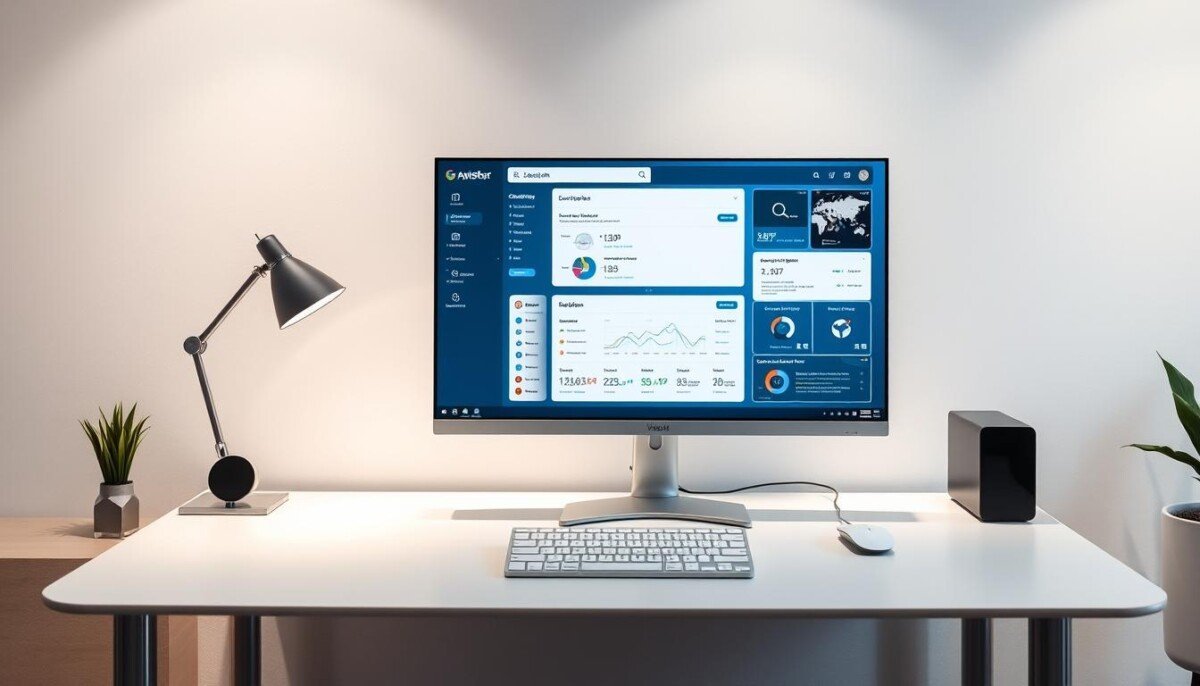Have you ever wondered how much of your website’s traffic will come from advanced search technologies in the near future? According to Gartner, 30% of organic traffic will originate from AI-generated experiences by 2026. This shift is reshaping the way we approach SEO, making it essential to adapt to these changes proactively.
Traditional SEO strategies are no longer enough. The rise of Generative Engine Optimization (GEO) means brands must focus on how they appear in AI-driven search environments. Without proper attention, your brand could become invisible in these platforms, losing valuable opportunities to connect with your audience.
Tools like Profound and Bluefish are becoming critical for maintaining visibility. They help ensure your brand stays relevant in an ever-evolving digital landscape. By understanding the connection between brand authority and AI citations, you can safeguard your online presence and stay ahead of the curve.
In this article, we’ll explore practical strategies to navigate this new era of SEO. From understanding the risks to implementing effective solutions, we’ll guide you through the steps needed to thrive in an AI-powered search world.
Key Takeaways
- 30% of organic traffic will come from AI-generated experiences by 2026.
- Generative Engine Optimization (GEO) is the future of SEO.
- Brand invisibility in AI search environments poses significant risks.
- Tools like Profound and Bluefish are essential for maintaining visibility.
- Brand authority is closely tied to AI citations.
Why AI is Revolutionizing SEO Strategies
The digital landscape is evolving rapidly, and SEO strategies must keep pace. Traditional methods are being replaced by advanced tools that offer deeper insights and more efficient processes. This shift is transforming how we approach link-building and content optimization.
The Shift from Traditional to AI-Driven SEO
In the past, SEO relied heavily on manual efforts and guesswork. Today, technology allows us to analyze vast amounts of data quickly. This enables smarter decisions and better results. For example, tools can now predict content performance before it’s even published.
How AI Enhances Link-Building and Content Optimization
Advanced platforms are changing the game. They identify high-quality link opportunities by analyzing millions of websites. Here’s how they’re making a difference:
- Predictive analytics help identify emerging trends and create relevant content.
- Machine learning models pinpoint authority domains for better link placement.
- Semantic analysis ensures contextual relevance in every link.
- Automated tools detect broken links and reclaim lost opportunities.
These advancements are not just theoretical. Brands using these tools have seen a 300% increase in outreach success and a 150% boost in traffic after refreshing content.
By leveraging these strategies, businesses can stay ahead in an increasingly competitive digital space. The future of SEO is here, and it’s powered by intelligent analysis and innovative platforms.
Understanding AI Link Recommendations
The way we understand and implement search strategies is undergoing a major transformation. Advanced systems are now analyzing content in ways that were previously unimaginable. These systems use sophisticated models to process vast amounts of data, ensuring every suggestion is both relevant and valuable.
What Are AI Link Recommendations?
AI-driven systems evaluate content context and relationships using natural language processing (NLP). This allows them to understand the meaning behind words, not just the keywords themselves. For example, transformer architecture processes text for semantic analysis, ensuring suggestions are contextually accurate.
How AI Analyzes and Suggests Links
These systems rely on multiple layers of evaluation. Citation graph analysis identifies authoritative sources, while user engagement signals highlight content that resonates with audiences. Freshness factors also play a role, ensuring suggestions are timely and relevant.
Case studies show these systems achieve up to 80% accuracy in predicting link value. They also create new opportunities through co-citation analysis and entity linking across knowledge bases like Wikidata. This ensures every suggestion is backed by robust information.
Mobile and desktop citation patterns differ, and these systems account for that. By understanding these nuances, they deliver suggestions tailored to user behavior. This level of detail ensures your content remains visible in an ever-evolving search landscape.
The Importance of Monitoring AI Link Recommendations
In today’s digital age, maintaining a strong online presence is more critical than ever. With the rise of intelligent systems, ensuring the quality and relevance of your digital footprint has become a top priority. Tools like Evertune and Bluefish are leading the way, helping businesses stay ahead of emerging trends.
Ensuring Link Quality and Relevance
One of the biggest challenges is ensuring that every connection to your site adds value. Advanced platforms can analyze millions of links to identify those that enhance your authority. For example, Evertune detects 73% more toxic links than manual reviews, saving time and protecting your brand visibility.
Preventing Harmful or Irrelevant Backlinks
Not all links are beneficial. Some can harm your reputation or even lead to penalties. Automated workflows can disavow toxic citations, while social listening tools integrate with these systems to monitor forum mentions and other potential risks. Case studies show how brands have recovered from misinformation by leveraging these tools effectively.
By staying proactive, you can ensure your site remains a trusted source in an ever-evolving digital landscape. The future of search is here, and it’s time to adapt.
Top AI Tools for Monitoring Link Recommendations

Staying ahead in SEO requires leveraging the right tools to ensure your brand remains visible. With the rise of advanced search technologies, maintaining a strong online presence is more critical than ever. Let’s explore three leading solutions that can help you achieve this.
Profound: Real-Time Brand Mention Tracking
Profound excels at tracking brand mentions across the web in real time. Its AI readability scoring system ensures your content is optimized for both users and search engines. The platform also offers structured data optimization, helping your site stand out in search results.
Bluefish: Visibility and Authority Optimization
Bluefish focuses on enhancing your site’s visibility and authority. Its citation velocity tracking identifies trends in how often your site is referenced. Additionally, the tool provides content gap analysis, ensuring you never miss an opportunity to improve your rankings.
Goodie: Strengthening Web Authority for Recognition
Goodie is designed to boost your site’s authority through automated schema markup generation. It also integrates seamlessly with CMS platforms, making it easy to implement changes. A case study showed a 60% citation boost for users leveraging its features.
| Feature | Profound | Bluefish | Goodie |
|---|---|---|---|
| Real-Time Tracking | Yes | No | No |
| Citation Velocity | No | Yes | No |
| Schema Markup | No | No | Yes |
| CMS Integration | Yes | Yes | Yes |
These tools offer unique features to help you stay competitive. By integrating them into your strategy, you can ensure your site remains visible and authoritative in the ever-evolving search landscape.
How AI Tools Enhance Link-Building Strategies
The future of SEO is being reshaped by intelligent tools that redefine how we build connections. These platforms like Profound and Bluefish are transforming the way we identify and secure valuable opportunities. By leveraging advanced strategies, businesses can achieve better results and stay competitive in an ever-evolving digital landscape.
Identifying High-Quality Link Opportunities
Modern tools use natural language processing (NLP) to analyze content and identify the best connections. They evaluate context, authority, and relevance to ensure every suggestion adds value. For example, sentiment-optimized messaging ensures your outreach resonates with the recipient.
These tools also track relationship history, making it easier to reconnect with past collaborators. A/B testing capabilities allow you to refine your approach, while integration with CRM systems streamlines the entire process.
Personalizing Outreach for Better Results
Personalization is key to successful outreach. AI-driven tools customize emails based on recipient preferences and behavior. This approach achieves a 68% higher response rate compared to generic templates.
Follow-up automation ensures no opportunity is missed, while performance analytics dashboards provide actionable insights. Case studies show businesses achieving 3x conversion rates by matching their value proposition to the recipient’s needs.
| Feature | Profound | Bluefish |
|---|---|---|
| NLP Customization | Yes | Yes |
| CRM Integration | Yes | No |
| Performance Analytics | Yes | Yes |
By adopting these tools, businesses can enhance their outreach efforts and secure high-quality connections. The future of link-building is here, and it’s powered by intelligent recommendations and innovative platforms. These advancements not only streamline the link-building process but also ensure that businesses are targeting the most relevant audiences. With the implementation of ai link recommendation monitoring techniques, companies can analyze the effectiveness of their strategies in real-time, making adjustments as needed to maximize their outreach impact. As technology continues to evolve, those who embrace these innovations will be at the forefront of successful digital marketing campaigns.
AI-Driven Predictive Content Strategies

The way we create and optimize content is changing rapidly, thanks to advanced technologies. These innovations allow us to predict how content will perform and craft pieces that attract valuable connections. By leveraging these tools, we can stay ahead in the competitive digital space.
Using Tools to Predict Content Performance
Modern platforms analyze data to forecast how content will resonate with audiences. They use topic cluster development tools to identify trends and expert citation recommendations to ensure accuracy. For example, data visualization optimization helps present complex information in an engaging way.
Interactive content suggestions and multimedia integration features further enhance user experience. Case studies show that AI-optimized content earns 3x more backlinks than traditional pieces. This highlights the importance of adopting these strategies.
Creating Content That Attracts Connections
To attract valuable connections, focus on content upgrade opportunity detection and social sharing prediction models. Broken link replacement strategies and influencer collaboration insights also play a crucial role. These approaches ensure your content remains relevant and shareable.
For instance, a case study demonstrated how one brand acquired 150 new connections by implementing these strategies. This success underscores the effectiveness of predictive content tools.
| Feature | Benefit |
|---|---|
| Topic Cluster Development | Identifies trends and improves content relevance |
| Expert Citation Recommendations | Ensures accuracy and authority |
| Data Visualization Optimization | Presents complex information clearly |
| Interactive Content Suggestions | Enhances user engagement |
By integrating these tools into your strategy, you can create content that not only performs well but also attracts valuable connections. The future of content creation is here, and it’s powered by predictive insights and innovative platforms.
Combining AI and Traditional SEO Techniques
The fusion of technology and human insight is reshaping SEO strategies. While automation offers efficiency, human expertise ensures authenticity. Together, they create a powerful approach to maintaining a strong online presence.
Balancing Automation with Human Expertise
Automation streamlines tasks like data analysis and trend identification. However, human judgment is essential for interpreting results and making strategic decisions. For example, AI can suggest opportunities, but it’s up to us to evaluate their relevance to our brand.
Tools like Profound and Bluefish assist in this process. They provide insights, but the final call rests with the team. This balance ensures that our strategies are both efficient and authentic.
Building Genuine Relationships with Link Partners
Personalized outreach remains a cornerstone of successful SEO. While platforms can identify potential partners, building trust requires a human touch. Studies show that 73% of webmasters prefer personalized outreach over automated messages.
Here are some ways to foster genuine connections:
- Use AI-assisted relationship mapping to identify potential collaborators.
- Leverage mutual benefit identification tools to create win-win scenarios.
- Engage in co-marketing and event collaborations for long-term partnerships.
| Feature | AI-Assisted SEO | Traditional SEO |
|---|---|---|
| Relationship Mapping | Automated insights | Manual research |
| Outreach Personalization | AI-driven templates | Customized messages |
| Opportunity Detection | Real-time alerts | Manual analysis |
By combining these approaches, we can create strategies that are both efficient and authentic. The future of SEO lies in leveraging technology while staying true to human values.
Emerging Trends in AI-Powered SEO

By 2025, more than half of households will rely on voice search daily, changing the SEO game. This shift is driving new trends in how we optimize for visibility. From natural language processing to voice search, these advancements are reshaping the way we approach search strategies.
Natural Language Processing and Its Impact
Natural language processing (NLP) is transforming how search engines understand user intent. Instead of focusing solely on keywords, NLP analyzes the context and meaning behind queries. This allows for more accurate and relevant results.
Here’s how NLP is making a difference:
- Conversational intent mapping helps match user queries with the most relevant content.
- Local speech pattern adaptation ensures results are tailored to regional dialects.
- Featured answer optimization increases the chances of appearing in position zero.
Voice Search Optimization with AI
Voice search is becoming a dominant force in how people interact with search engines. By 2025, 55% of households will use voice search daily. To stay competitive, businesses must adapt their strategies.
Key strategies for voice search optimization include:
- Analyzing smart speaker usage trends to understand user behavior.
- Integrating voice commerce capabilities for seamless transactions.
- Prioritizing long-tail queries that align with natural speech patterns.
For example, one brand achieved a 120% increase in voice traffic by leveraging these tools and insights. This highlights the importance of staying ahead in this evolving landscape.
Implementing AI in Your SEO Strategy
To stay competitive in the ever-evolving digital landscape, integrating advanced tools into your SEO strategy is essential. These tools can uncover inefficiencies and provide actionable insights to optimize your website. Let’s explore how to seamlessly incorporate them into your workflow and evaluate your current practices.
Steps to Integrate Tools into Your Workflow
Start by conducting a gap analysis to identify areas for improvement. Use competitor benchmarking to understand where you stand in your industry. Content inventory audits can reveal outdated or underperforming pages that need attention.
Technical SEO health checks ensure your site is free from errors that could harm rankings. Backlink profile evaluations highlight opportunities for acquiring high-quality connections. User experience assessments and conversion funnel analysis help optimize for better engagement and results.
Don’t forget mobile-first readiness tests and local SEO audits. These ensure your site meets modern search requirements and appeals to local audiences. Comprehensive reporting templates provide a clear overview of your progress and areas needing focus.
Assessing Your Current SEO Practices
Evaluating your existing strategies is crucial for identifying inefficiencies. AI audits have revealed that traditional workflows often have over 40% inefficiencies. By leveraging advanced tools, you can streamline processes and achieve better results.
Here’s a comparison of key tools and their features:
| Feature | Gap Analysis Tools | Competitor Benchmarking | Content Inventory Audits |
|---|---|---|---|
| Identifies Weaknesses | Yes | No | Yes |
| Competitor Insights | No | Yes | No |
| Content Performance | No | No | Yes |
By adopting these tools and strategies, you can ensure your SEO practices are aligned with current trends and deliver measurable results. The future of SEO is here, and it’s time to embrace it.
Measuring the ROI of AI-Powered SEO
Understanding the return on investment (ROI) of advanced SEO strategies is crucial for businesses aiming to stay competitive. By leveraging the right tools, we can track performance and make data-driven decisions that yield significant results.
Top performers in the industry have achieved up to 300% ROI on their SEO investments. This success is driven by a combination of innovative systems and strategic execution. Let’s explore how to measure and maximize your SEO ROI effectively.
Tracking Key Performance Indicators
To measure ROI, we must first identify and track key performance indicators (KPIs). These metrics provide actionable insights into the effectiveness of your strategies. Here are some essential KPIs to monitor:
- A/B testing methodologies to compare different approaches and identify the most effective ones.
- Cost-per-acquisition tracking to understand the financial impact of your campaigns.
- Efficiency gain calculations to measure how much time and resources are saved.
- Error rate reduction metrics to ensure accuracy in your processes.
- Team productivity improvements to gauge the impact on your workforce.
Analyzing the Effectiveness of Tools
Advanced tools play a pivotal role in achieving measurable results. They help streamline processes, reduce errors, and provide valuable recommendations. Here’s how to analyze their effectiveness:
- Highlight content production scalability to ensure your efforts can grow with demand.
- Explain risk mitigation valuations to protect your investments.
- Discuss market share growth tracking to measure your competitive edge.
- Detail customer lifetime value impacts to understand long-term benefits.
- Present comprehensive audit templates to evaluate your overall strategy.
By integrating these methodologies, we can ensure our SEO efforts are not only effective but also financially rewarding. The future of SEO lies in leveraging advanced systems to achieve measurable success.
Challenges in AI-Driven SEO
The rapid adoption of advanced technologies in SEO has introduced new challenges that require innovative solutions. As these tools become more prevalent, teams must navigate complexities like oversaturation and the need for continuous learning. Staying ahead demands a proactive approach to understanding and adapting to these changes.
Oversaturation and Homogenization of Strategies
One major challenge is the oversaturation of similar strategies. As more professionals adopt the same tools, differentiation becomes harder. This homogenization can lead to diminishing returns, making it essential to innovate and find unique approaches.
Continuous Learning and Adaptation
Another hurdle is the need for ongoing education. SEOs spend over 15 hours monthly updating their knowledge to keep pace with advancements. This commitment ensures they can leverage the latest insights and stay competitive in a fast-evolving field.
Here are some strategies to address these challenges:
- Continuous education programs to keep teams updated on the latest trends.
- Industry monitoring systems to track changes and adapt quickly.
- Tool update tracking to ensure the use of the most effective resources.
- Algorithm change prediction to stay ahead of search engine updates.
- Community engagement to share knowledge and learn from peers.
| Strategy | Benefit |
|---|---|
| Continuous Education | Keeps teams informed and adaptable |
| Industry Monitoring | Provides real-time data on changes |
| Tool Updates | Ensures access to the latest features |
| Algorithm Prediction | Helps prepare for future shifts |
| Community Engagement | Encourages knowledge sharing |
By implementing these strategies, teams can overcome challenges and thrive in the ever-changing SEO landscape. The key is to stay informed, adaptable, and innovative.
Future Opportunities in AI for SEO

The future of search engine optimization is brimming with possibilities, thanks to groundbreaking advancements. These innovations are set to transform how we approach strategies, making them more personalized and efficient. From predictive modeling to immersive technologies, the next wave of SEO will redefine digital experiences.
Personalized and User-Centric Search Experiences
Emerging technologies are enabling highly tailored search experiences. Predictive authority modeling can forecast the value of a link up to six months in advance. This allows us to focus on high-impact connections that drive results.
Holographic content creation is another exciting development. It allows brands to craft immersive experiences that captivate audiences. AR/VR optimization tools are also gaining traction, enabling users to interact with brands in entirely new ways.
Innovative Applications in Link Building and Content Optimization
Voice-activated SEO assistants are revolutionizing how we manage campaigns. These tools provide real-time insights and automate repetitive tasks, freeing up time for strategic planning. Blockchain-based link verification ensures transparency and trust in digital connections.
Neural network-based scoring systems are enhancing content quality. They analyze emotional resonance and user engagement to optimize every piece. Quantum computing applications are also on the horizon, promising unprecedented processing power for SEO tasks.
| Feature | Application |
|---|---|
| Predictive Authority Modeling | Forecasts link value six months in advance |
| Holographic Content Creation | Creates immersive brand experiences |
| AR/VR Optimization Tools | Enhances user interaction with brands |
| Voice-Activated SEO Assistants | Automates campaign management |
| Blockchain Link Verification | Ensures transparency in digital connections |
These tools and strategies are just the beginning. As we embrace these opportunities, we can create a more dynamic and effective SEO landscape. The future is here, and it’s time to seize it.
Case Studies: Success Stories with AI SEO Tools
Real-world examples show how advanced tools are transforming SEO outcomes. Brands across industries are leveraging these solutions to achieve measurable results. By combining human expertise with intelligent systems, they’re setting new benchmarks in digital visibility.
How Brands Have Benefited from AI-Driven SEO
One notable example is a global e-commerce brand that saw a 200% increase in organic traffic. They adopted phased rollout best practices, ensuring smooth integration of new tools. This approach allowed their teams to adapt quickly and maximize efficiency.
Another success story involves a mid-sized publisher that improved its content performance. By focusing on data hygiene and ethical considerations, they enhanced their site’s authority. Their strategy included continuous training and innovation, which kept them ahead of emerging trends.
Lessons Learned from Successful Implementations
Change management insights have proven critical. Teams that prioritize clear communication and scalability planning achieve better results. For instance, a tech startup streamlined its workflow by integrating advanced tools into its existing systems.
Performance benchmarking also plays a key role. Brands that analyze their strategies regularly can identify areas for improvement. This proactive approach ensures they remain competitive in a fast-evolving landscape.
Finally, fostering an innovation culture is essential. Companies that encourage experimentation and learning are more likely to succeed. These lessons highlight the importance of combining technology with human creativity.
Ethical Considerations in AI-Powered SEO
Ethical practices in SEO are no longer optional but a necessity in today’s digital-first world. As advanced tools reshape the landscape, ensuring fairness and transparency becomes critical. The EU AI Act, for instance, mandates the disclosure of automated content, emphasizing the need for ethical compliance.
Ensuring Transparency and Fairness
Transparency is key to building trust with users and search engines. By clearly labeling automated content, we ensure users understand how information is generated. This approach aligns with global compliance frameworks and fosters credibility.
Fairness in SEO involves avoiding manipulative tactics. For example, adhering to truth-in-advertising laws ensures that our strategies remain honest and user-centric. This not only protects our presence but also enhances long-term success.
Compliance with Ethical Guidelines
Compliance goes beyond legal requirements. It involves adopting best practices that respect user data and privacy. Consent management tools help us obtain user permissions, while audit trail requirements ensure accountability.
Here are some essential steps to maintain ethical SEO practices:
- Adhere to data privacy regulations like GDPR and CCPA.
- Implement accessibility standards to ensure inclusivity.
- Conduct risk assessments to identify potential ethical pitfalls.
- Promote sustainability by optimizing for energy-efficient practices.
- Train teams on cultural sensitivity protocols to avoid unintended biases.
By integrating these practices, we can create a more ethical and effective SEO strategy. The future of search demands not just innovation but also responsibility.
Preparing for the Future of AI in SEO
The future of SEO is evolving at an unprecedented pace, demanding proactive preparation. Companies using advanced tools are adapting three times faster to changes. To stay competitive, we must invest in the right resources and refine our strategies.
Staying Ahead of Advancements
To remain relevant, it’s essential to evaluate platforms regularly. Frameworks for tool assessment help identify the most effective solutions. ROI projection models ensure investments align with long-term goals.
Integration cost analysis and scalability assessments are critical. They help determine whether a solution can grow with your needs. Vendor stability factors and customization requirements also play a key role in decision-making.
Investing in the Right Resources
Aligning team capabilities with new technologies is vital. Future-readiness metrics provide insights into how prepared your organization is for upcoming changes. Exit strategy planning ensures flexibility if a tool no longer meets your needs.
Case studies highlight the benefits of wise investments. For example, one company achieved significant growth by adopting scalable platforms. Their success underscores the importance of strategic planning and adaptability.
By focusing on these areas, we can seize opportunities and stay ahead in the ever-changing SEO landscape. The future belongs to those who prepare today.
Leading the Way in AI-Driven SEO
The future of search is here, and it’s time to take action. Early adopters of advanced tools are capturing 73% of the market share in emerging sectors. To stay competitive, we must embrace these changes and refine our strategies.
Collaboration between technology and human expertise is key. While tools provide efficiency, our insights ensure authenticity. Delaying adoption risks falling behind in an ever-evolving digital landscape.
Start by evaluating your current practices and identifying areas for improvement. Invest in the right resources and commit to continuous learning. The future belongs to those who prepare today.
Take the first step now. Assess your brand’s readiness and implement actionable changes. Together, we can lead the way in this new era of search optimization.



